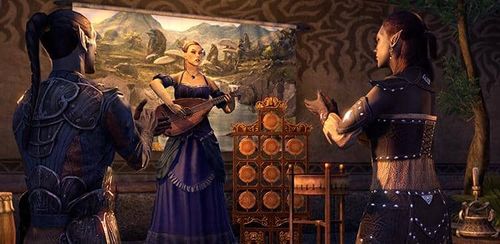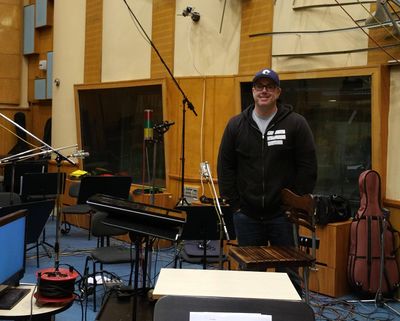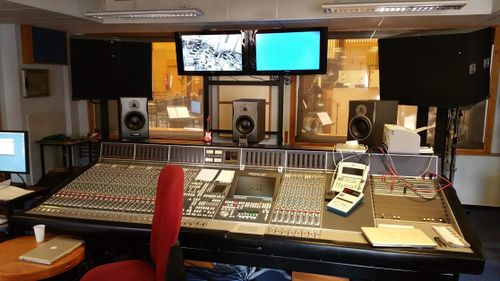General:Check out the ESO: Morrowind Soundtrack and Composer Interview
Originally published June 22, 2017. The original article can be found here.
(The Spotify web player for the ESO:Morrowind Soundtrack is embedded into the article. Link here)
ESO: Morrowind's entire soundtrack is now available on Spotify, iTunes, Google, and Amazon!
Brad Derrick is studio Audio Director and composer for the ESO: Morrowind soundtrack. In celebration of the soundtrack's release, we asked him a few questions about his process and the challenges associated with making the music for an Elder Scrolls game.
The Elder Scrolls series (and The Elder Scrolls III: Morrowind in particular) has a lot of history behind it. How do you go about creating something new and fresh while retaining the series' iconic elements?
Meeting that challenge for ESO: Morrowind was essentially a heightened version of meeting that challenge for the game as a whole. For The Elder Scrolls Online, the music has to bridge the gap between the familiar and the new, satisfying player expectations while still having a unique identity. This means making sure the music is "Elder Scrolls-y" enough to sound like it's from the same universe as the other games, but at the same time different enough so that it's clearly ESO music, belonging to the time and spaces of our game.
It began as an exercise in reverse-engineering what makes the scores for other Elder Scrolls games tick. Some of that is pretty straightforward - broadly identifying things like instrumentation (large orchestra, live chorus, booming percussion, etc.) and style (late 19th / early 20th century era) to use as a musical framework for future compositions. But some of it is more difficult to nail down, and therefore more difficult to reproduce - the wonderful, memorable melodies of the music in the series for example. It's one thing to say, "This new Elder Scrolls music must have wonderful, memorable melodies." It's quite another to actually make that happen. To that end, I have a musical sketchbook in which I'm always squirreling away ideas as they come. Melodies and themes, phrases and fragments, or even just harmonic progressions all get recorded in their crudest form and stockpiled for a later time.
Therefore, when it's time to write new music, my creative space exists at the intersection of three things: the musical framework that defines "Elder Scrolls" music, the needs of the particular game content at hand, and my collection of half-finished ideas. The first of those three keeps the music faithful to the series, the second keeps it faithful to our game, and the third - if I do my job well - does both.
Of course, the most direct way to serve both of those masters is to quote and reinterpret thematic material from other games in the series. I've done that a few times in various pieces in the past, slipping in melodies here and there and reworking them, giving the players something to perk their ears up as they travel lands from the other Elder Scrolls games. But with the ESO: Morrowind release having such nostalgia associated with it, I wanted to do even more of that, even going so far as to replace the game's title theme with something that hearkened back to the original theme from TES III: Morrowind.
Broadly speaking, what were the major steps involved when planning and composing the music for ESO: Morrowind?
Almost all of the music in ESO is performed live, and the music of ESO: Morrowind is no exception. Like our other soundtracks, we had about six months to take the score from inception to completion. That always feels like plenty of time at first, but given the complex production schedule - not to mention the ongoing duties of my "real" job as Audio Lead - things invariably get rather hectic towards the end.
Scheduling out a production timeline like this naturally starts at the end and works backwards. Once I know the date the final score has to be integrated into the game, I can finalize what has to be done and when, and what can be done in parallel and what cannot.
Here is the basic roadmap for taking the ESO: Morrowind score from idea to reality:
- I am told told we're going to do an ESO Chapter with a new title theme.
- Compose for 6-8 weeks. I break out the idea book and see if there are any gems in there and figure out what Morrowind themes I want to quote.
- Contact our music contractors to book the orchestra, chorus, and soloists.
- Complete the composition.
- Send our music contractors all my scores, temp mixes using fake (not live) instruments, notes, etc. so they can prep for the live sessions. Book the hall, the musicians, the engineers, print the scores out, and much much more.
- Write bard songs while the contractors are doing the above - 2 weeks.
- Live orchestra and chorus sessions - 1 week in Budapest.
- Live soloist sessions (violin, cello, lute parts for bard songs, etc.) - 1 week in Budapest.
- Begin mixing live orchestra and chorus tracks into my sessions with other production elements (percussion, synths, harp, sound design, etc.) - 4 weeks.
- Get the bard songs sung by real singers in LA - 1 week. Finally, thankfully, my temporary vocals are replaced.
- Final mix sessions in LA - 1 week. This is when I find out at long last if this stuff sounds any good.
- Mastering – a couple of days.
- Final integration into the game engine of all soundtrack and bard song assets - 1 week.
- Final playtesting - 1 week.
When creating the music for The Elder Scrolls Online, you had to create pieces for a number of different player activities, whether it be exploring, questing, or combat. How do you approach the game's different experiences when crafting an entire soundtrack?
I think the real answer here lies in the integration, not in the composition. Writing music specifically for those kinds of activities is the easy (well, easier) part. The hard part is getting them to transition in a manner that is meaningful, satisfying, and not jarring or immersion-breaking in any way. We've put a lot of effort into this, and while I won't say we've nailed it 100%, I think we've done a pretty good job.
It's a real shame when good music suffers at the hands of bad integration. Few things in game audio irk me as much as hearing abrupt cutoffs or an over-reliance on crossfades when transitioning between pieces. It feels lazy, and it takes me out of the moment. To draw comparisons to linear mediums like film and television is probably unfair, but I'll do it anyway: When a movie protagonist enters a cave, kills a bad guy, or does something otherwise dramatic, the film score highlights those moments and moves between them fluidly. The music for the cave scene has a beginning, middle, and end. The fight scene music doesn't fade out...it ends, definitively.
That's been the goal with ESO's music system - to make the underscoring of what the player is doing as fitting and seamless as possible. Ambient underscore will be appropriate to where the player is and what the player is doing. And when that changes, the change in music will feel natural, perhaps even unnoticed. When the player is in combat, the musical intensity will ramp up or down depending on the number of enemies or the presence of a boss, and when the fight is over, the music will reach a musical conclusion rather than just fade away.
Like most things in a MMO, it's a work in progress, subject to constant review (me playing at home) and improvement (me pestering our fantastic audio programmer, David Jorgenson). But it's a solid system, and it's a joy to create new pieces of music to drop into the machine and hear how they all come together in actual gameplay.
Was there any particular piece that you found especially challenging to compose? Why?
Yes. The title theme. Why? Because it's the title theme.
A game's title theme is arguably the most important piece in any soundtrack. It's the musical identity of the game, used for branding and marketing, and heard by players every single time they log on to play (except players that turn off the music...you monsters!). Adding to that is the fact that I was updating the classic TES III: Morrowind theme that was originally penned by Jeremy Soule and featured in Oblivion, Skyrim, and ESO for the last three years. So...no pressure, right?
That said, once the new direction for the theme was decided - a sung version of the classic melody with actual lyrics in an ancient Dark Elf language - everything else kind of fell into place. I spent a good bit of time doing vocal part writing up front, coming up with four-part choral arrangements of that lyric melody, until I arrived at some things that I felt would make good "tent poles" or high points of the piece. Then it was a matter of mapping out the spaces between them - solo violin interpretation goes here, bombastic reprise goes there - and before I knew it, I had a four-minute exploration of that theme that satisfied the goals (see above) of bridging the gap between the familiar and the new.
There's a lot going on in that piece over those four minutes; it goes in a lot of different directions, to a lot of different places, but they all come from the same basic musical material - that simple, timeless, 15-year-old theme.
How did you get your start composing game music?
About a thousand years ago in game dev time (1995), I was finishing up a Masters in Electronic Composition when a friend sent me something called an "email" on the "internet" (seriously, these were things I was barely aware of at that time) asking if I wanted to come make sound effects at a game company called Kesmai. I actually didn't get his email, because - again, 1995 net newb - I don't think I knew how to check my email, but I bumped into him one night and he was like, "Dude? Did you not get my email? Do you not want to come make sound effects for video games?" I responded, "Oh, uh, okay, sure, I guess." I was that close to none of this ever happening.
That's how I ended up working for MMO pioneers Kesmai for six years, over which time I worked my way up from part-time sound designer to full-time sound designer to audio-guy-who-does-everything-cuz-he's-the-only-one-left. I finally got to use my Masters in Electronic Composition degree simply because there was no one else around to write music. I spent eight years after that at Mythic Entertainment working on Dark Age of Camelot and Warhammer Online, and then the next eight at Zenimax Online Studios.
So here I am, still getting to do my favorite things in the whole word: make music and make games!
Enjoy the music of ESO: Morrowind? Let us know what you think of it on Twitter @TESOnline.


